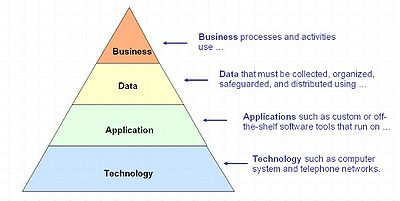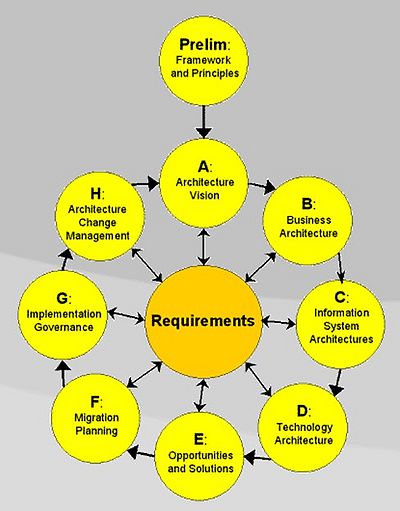Enterprise architecture framework: Difference between revisions
m (Created page with '{{stub}} == Introduction == An enterprise architecture (EA) framework is a "language" that allows to describe the architecture of organizations. [http://en.wikipedia.org/wiki…') |
mNo edit summary |
||
| Line 17: | Line 17: | ||
* [http://en.wikipedia.org/wiki/Technical architecture] or ''technology architecture'' which describes the hardware, software and network infrastructure needed to support the deployment of core, mission-critical applications. (retrieved 16:59, 23 June 2010 (UTC)) | * [http://en.wikipedia.org/wiki/Technical architecture] or ''technology architecture'' which describes the hardware, software and network infrastructure needed to support the deployment of core, mission-critical applications. (retrieved 16:59, 23 June 2010 (UTC)) | ||
[[image:Layers_of_the_Enterprise_Architecture.jpg| | [[image:Layers_of_the_Enterprise_Architecture.jpg|thumb|400px|none|Layers of enterprise architecture. Source: Niles E Hewlett (2006) via [http://en.wikipedia.org/wiki/File:Layers_of_the_Enterprise_Architecture.jpg Wikipedia] ]] | ||
An interesting TOGAF topic concerns architecture development including [[change management]]: | An interesting TOGAF topic concerns architecture development including [[change management]]: | ||
[[image:TOGAF_ADM.jpg| | [[image:TOGAF_ADM.jpg|thumb|400px|none|TOGAF Architecture Development Method. Source: S. Marley, NASA via [http://en.wikipedia.org/wiki/File:TOGAF_ADM.jpg Wikipedia] ]] | ||
== Links == | == Links == | ||
Revision as of 18:04, 23 June 2010
Introduction
An enterprise architecture (EA) framework is a "language" that allows to describe the architecture of organizations.
Wikipedia (retrieved June 22, 2010) describes “An enterprise architecture (EA) [as] a rigorous description of the structure of an enterprise, its decomposition into subsystems, the relationships between the subsystems, the relationships with the external environment, the terminology to use, and the guiding principles for the design and evolution of an enterprise.[1][2][3] This description is comprehensive, including enterprise goals, business functions, business process, roles, organisational structures, business information, software applications and computer systems. [...] Enterprise architects use various business methods, analytical techniques and conceptual tools to understand and document the structure and dynamics of an enterprise. In doing so, they produce lists, drawings, documents and models, together called "artifacts". These artifacts describe the logical organization of business functions, business capabilities, business processes, people organization, information resources, business systems, software applications, computing capabilities, information exchange and communications infrastructure within the enterprise.”
Examples of EA frameworks
The Open Group Architecture Framework
According to Wikipedia, The Open Group Architecture Framework (TOGAF) is based on four pillars, called domains:
- architecture or business process architecture which defines the business strategy, governance, organization, and key business processes of the organization
- architecture which provides a blueprint for the individual application systems to be deployed, the interactions between the application systems, and their relationships to the core business processes of the organization with the frameworks for services to be exposed as business functions for integration.
- architecture which describes the structure of an organization's logical and physical data assets and the associated data management resources
- architecture or technology architecture which describes the hardware, software and network infrastructure needed to support the deployment of core, mission-critical applications. (retrieved 16:59, 23 June 2010 (UTC))

An interesting TOGAF topic concerns architecture development including change management:

Links
- Some Wikipedia links
- Enterprise architecture
- enterprise architecture framework
- Business processes
- business architecture
- process architecture
- Operating Model
- architecture domains
- TOGAF
- Open Source Enterprise Architecture Tools
- Introductions
- Niles E Hewlett (2006), The USDA Enterprise Architecture Program. PMP CEA, Enterprise Architecture Team, USDA-OCIO. January 25, 2006. PPT